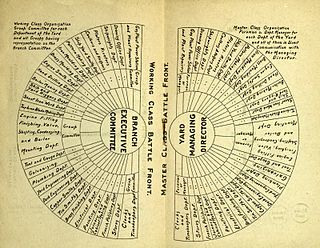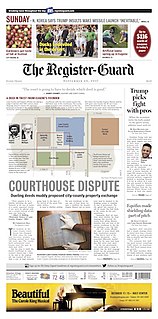
A tradesman, tradeswoman, tradesperson, skilled tradesman, skilled tradeswoman, skilled tradesperson or tradie refers to a worker who specializes in a particular occupation that requires work experience, on-the-job training, and often formal vocational education, but not a bachelor's degree.

Industrial unionism is a labour union organizing method through which all workers in the same industry are organized into the same union—regardless of skill or trade—thus giving workers in one industry, or in all industries, more leverage in bargaining and in strike situations. Advocates of industrial unionism value its contributions to building unity and solidarity, many suggesting the slogans, "an injury to one is an injury to all" and "the longer the picket line, the shorter the strike."
Employment is a relationship between two parties, usually based on a contract where work is paid for, where one party, which may be a corporation, for profit, not-for-profit organization, co-operative or other entity is the employer and the other is the employee. Employees work in return for payment, which may be in the form of an hourly wage, by piecework or an annual salary, depending on the type of work an employee does or which sector she or he is working in. Employees in some fields or sectors may receive gratuities, bonus payment or stock options. In some types of employment, employees may receive benefits in addition to payment. Benefits can include health insurance, housing, disability insurance or use of a gym. Employment is typically governed by employment laws, regulations or legal contracts.

Underemployment is the under-use of a worker due to a job that does not use the worker's skills, or is part time, or leaves the worker idle. Examples include holding a part-time job despite desiring full-time work, and overqualification, where the employee has education, experience, or skills beyond the requirements of the job.
A freelancer or freelance worker, is a term commonly used for a person who is self-employed and is not necessarily committed to a particular employer long-term. Freelance workers are sometimes represented by a company or a temporary agency that resells freelance labor to clients; others work independently or use professional associations or websites to get work.
Craft unionism refers to a model of trade unionism in which workers are organised based on the particular craft or trade in which they work. It contrasts with industrial unionism, in which all workers in the same industry are organized into the same union, regardless of differences in skill.

Communications Workers of America (CWA) is the largest communications and media labor union in the United States, representing about 700,000 members in both the private and public sectors(also in Canada and Puerto Rico). The union has 27 locals in Canada via CWA-SCA Canada representing about 8,000 members. CWA has several affiliated subsidiary labor unions bringing total membership to over 700,000. CWA is headquartered in Washington, DC, and affiliated with the AFL-CIO, the Canadian Labour Congress, and UNI Global Union. The current president is Chris Shelton.

The Register-Guard is a daily newspaper in the western United States, published in Eugene, Oregon. It was formed in a 1930 merger of two Eugene papers, the Eugene Daily Guard and the Morning Register. The paper serves the Eugene-Springfield area, as well as the Oregon Coast, Umpqua River valley, and surrounding areas. As of 2016, it has a circulation of around 43,000 Monday through Friday, around 47,000 on Saturday, and a little under 50,000 on Sunday.
A skilled worker is any worker who has special skill, training, knowledge, and ability in their work. A skilled worker may have attended a college, university or technical school. Or, a skilled worker may have learned their skills on the job. Examples of skilled labor include engineers, software development, paramedics, police officers, soldiers, physicians, crane operators, truck drivers, machinist, drafters, plumbers, craftsmen, cooks and accountants. These workers can be either blue-collar or white-collar workers, with varied levels of training or education.

The NewsGuild-CWA is a labor union founded by newspaper journalists in 1933. In addition to improving wages and working conditions, its constitution says its purpose is to fight for honesty in journalism and the news industry's business practices.
The eight-hour day movement or 40-hour week movement, also known as the short-time movement, was a social movement to regulate the length of a working day, preventing excesses and abuses. It had its origins in the Industrial Revolution in Britain, where industrial production in large factories transformed working life. The use of child labour was common. The working day could range from 10 to 16 hours, and the work week was typically six days a week. Robert Owen had raised the demand for a ten-hour day in 1810, and instituted it in his socialist enterprise at New Lanark. By 1817 he had formulated the goal of the eight-hour day and coined the slogan: "Eight hours' labour, Eight hours' recreation, Eight hours' rest". Women and children in England were granted the ten-hour day in 1847. French workers won the 12-hour day after the February Revolution of 1848. A shorter working day and improved working conditions were part of the general protests and agitation for Chartist reforms and the early organisation of trade unions.
The Journeymen Cigar Makers' International Union of America (CMIU) was a labor union established in 1864 that represented workers in the cigar industry. The CMIU was part of the American Federation of Labor from 1887 until its merger in 2003.

The American Postal Workers Union (APWU) is a labor union in the United States. It represents over 200,000 employees and retirees of the United States Postal Service who belong to the Clerk, Maintenance, Motor Vehicle, and Support Services divisions. It also represents approximately 2,000 private-sector mail workers.

The American Labor Union (ALU) was a radical labor organization launched as the Western Labor Union (WLU) in 1898. The organization was established by the Western Federation of Miners (WFM) in an effort to build a federation of trade unions in the aftermath of the failed Leadville Miners' Strike of 1896. The group changed its name from WLU to the more familiar ALU moniker in 1902 at its fifth annual convention. The group had a peak membership of about 43,000 — of which 27,000 were members of the WFM. The ALU was a precursor to the Industrial Workers of the World (IWW), established in 1905, which effectively terminated it.

The Coeur d'Alene, Idaho, labor strike of 1892 erupted in violence when labor union miners discovered they had been infiltrated by a Pinkerton agent who had routinely provided union information to the mine owners. The response to that violence, disastrous for the local miners' union, became the primary motivation for the formation of the Western Federation of Miners (WFM) the following year.

The Charleston Gazette-Mail is the only daily morning newspaper in Charleston, West Virginia. It is the product of a July 2015 merger between the Charleston Gazette and the Charleston Daily Mail.

The Federated Ironworkers' Association of Australia (FIA) was an Australian trade union which existed between 1911 and 1991. It represented labourers and semi-skilled workers employed in the steel industry and ironworking, and later also the chemical industry.

The Congress of Industrial Organizations (CIO) was a federation of unions that organized workers in industrial unions in the United States and Canada from 1935 to 1955. Created in 1935 by John L. Lewis, who was a part of the United Mine Workers (UMW), it was originally called the Committee for Industrial Organization but changed its name in 1938 when it broke away from the American Federation of Labor. It also changed names because it was not successful with organizing unskilled workers with the AFL.
The Chicago Newspaper strike of 1912 is a strike that ran from May until November. It was primarily held by the pressmen, and supported by other unions such as the stereotypers. The pressmen union attempted to bring attention to conglomerate newspaper publishers' attempts at breaking up printing unions.














